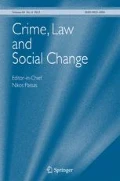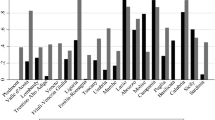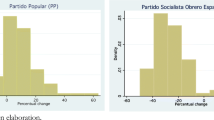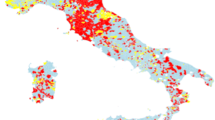Abstract
Previous studies of the electoral consequences of corruption in Spanish local elections (Jiménez Revista de Investigaciones Políticas y Sociológicas, 6(2):43–76, 2007; Fernández-Vázquez and Rivero 2011, Consecuencias electorales de la corrupción, 2003–2007. Estudios de Progreso, Fundación Alternativas; Costas et al. European Journal of Political Economy: 28(4):469-484, 2012) have found that voters do not necessarily punish corrupt mayors. As has been pointed out in the comparative literature, the average loss of electoral support by corrupt incumbents is small and does not prevent their reelection most of the times (Jiménez and Caínzos 2006, How far and why do corruption scandals cost votes? In Garrard, J. and Newell, J. (eds.) Scandals in past and contemporary politics. Manchester: Manchester University Press). What remains unsolved, however, is the remarkable variability in this pattern. This article explores some of the micro-level variables that may mediate the effect of corruption scandal on the votes. We focus on three factors: ideological closeness to the incumbent party, political sophistication, and employment status. Our results provide only partial support for our hypotheses, suggesting that the effects of corruption are much more complex than what may seem at first sight.


Similar content being viewed by others
Notes
We are grateful to the CIS for providing access to a partially non-anonymous version of these surveys that allowed us to identify the municipality in which each respondent is registered to vote.
Those who did not vote due to technical reasons or to force majeure are also coded as non-voters. As a robustness check, we have replicated all our models coding these technical non-voters as missing values. Results do not show any systematic difference and are available upon request.
It must be mentioned that effects did not change when random effects by municipality were introduced. In fact, the negative effect of corruption on support for PSOE incumbents became even more strongly significant in the hierarchical model (p < 0.001).
Results of non-significant interaction effects are not shown here, but they are available upon request.
A similar effect is found for PSOE in 2007, but in this case it is not statistically significant.
Another exception is the PP in 2011. In this case, it is employed voters that seem more likely to support corrupt PP incumbents. However, the effect is hardly significant levels.
References
Anderson, C., & Tverdova, Y. (2003). Corruption, political allegiances, and attitudes toward government in contemporary democracies. American Journal of Political Science, 47(1), 91–109.
Anduiza, E. (1999). ¿Individuos o sistemas? Las razones de la abstención en Europa Occidental. Madrid: Centro de Investigaciones Sociológicas.
Anduiza, E., A. Gallego, and J. Muñoz (2014). Turning a blind eye: experimental evidence of partisan bias in attitudes towards corruption. Comparative Political Studies (Forthcoming).
Banducci, S., & Karp, J. (1994). Electoral consequences of scandal and reapportionment in the 1992 house elections. American Politics Research, 22(1), 3.
Barberá, P. and P. Fernández-Vázquez (2012). Los electores ante la corrupción. En Fundación Alternativas (ed.) Informe sobre la democracia en España, 2012.
Barreiro, B., & Sánchez-Cuenca, I. (2000). Las consecuencias electorales de la corrupción. Historia y política: Ideas, procesos y movimientos sociales, 4, 69–92.
Campbell, A., Converse, P. E., Miller, W. E., & Stokes, D. E. (1960). The American Voter. New York: Wiley.
Chang, E., Golden, M., & Hill, S. (2010). Legislative malfeasance and political accountability. World Politics, 62(02), 177–220.
Chong, A., A. De La O, D. Karlan, and L. Wantchekon (2012). Looking beyond the incumbent: The effects of exposing corruption on electoral outcomes. CEPR Discussion Paper, 8790.
Costas-Pérez, E., Solé-Ollé, A., & Sorribas-Navarro, P. (2012). Corruption scandals, voter information, and accountability. European Journal of Political Economy, 28(4), 469–484.
Della Porta, D. (1997). Social capital, beliefs in government, and political corruption. In Pharr, S. and Putnam, D., editors, Disaffected democracies: What’s troubling the trilateral countries? Pinter.
Fackler, T., & Lin, T. (1995). Political corruption and presidential elections, 1929–1992. The Journal of Politics, 57(4), 971–993.
Fearon, J. (1999). Electoral accountability and the control of politicians: selecting good types versus sanctioning poor performance. In Przeworski, A., Stokes, S. and Manin, B. (eds.) Democracy, Accountability and Representation. Cambridge: Cambridge University Press.
Ferejohn, J. (1986). Incumbent performance and electoral control. Public Choice, 50, 5–25.
Fernández-Vázquez, P. and G. Rivero (2011). Consecuencias electorales de la corrupción, 2003–2007. Estudios de Progreso, Fundación Alternativas.
Ferraz, C., & Finan, F. (2008). Exposing corrupt politicians: The effects of Brazil’s publicly released audits on electoral outcomes. Quarterly Journal of Economics, 123(2), 703–745.
Golden, M. A. (2003). Electoral connections: The effects of the personal vote on political patronage, bureaucracy and legislation in postwar Italy. British Journal of Political Science, 33, 189–212.
Harrop, M. and W. L. Miller (1987). Elections and Voters: A Comparative Introduction. London: Macmillan.
Jacobson, G. (1999). Impeachment politics in the 1998 congressional elections. Political Science Quarterly, 114(1), 31–51.
Jacobson, G., & Dimock, M. (1994). Checking out: The effects of bank overdrafts on the 1992 house elections. American Journal of Political Science, 38(3), 601–624.
Jiménez, F. (2007). Luces y sombras en el control de la corrupción: las elecciones municipales del 27 de mayo de 2007. Revista de Investigaciones Políticas y Sociológicas, 6(2), 43–76.
Jiménez, F. and Caínzos, M. (2006). How far and why do corruption scandals cost votes? In Garrard, J. and Newell, J. (eds.) Scandals in past and contemporary politics. Manchester: Manchester University Press.
Johnston, R., Jones, K., Propper, C., Sarker, R., Burgess, S., & Bolster, A. (2005). A missing level in the analyses of British voting behaviour: the household as context as shown by analyses of a 1992–1997 longitudinal survey. Electoral Studies, 24(2), 201–225.
Kanthak, K. (2011). The hidden effects of rules not broken: Career paths, institutional rules and anticipatory exit in legislatures. British Journal of Political Science, 41(4), 841–857.
Key, V. O., Jr. (1966).The responsibleelectorate: rationality in presidential voting, 1936-19600. New York: Vintage
Klasnja, M., J. Tucker, and K. Deegan-Krause (2012). Pocketbook vs. sociotropic corruption voting. Unpublised manuscript, New York University.
Kunicova, J., & Rose-Ackerman, S. (2005). Electoral rules and constitutional structures as constraints on corruption. British Journal of Political Science, 35(4), 573–606.
Kurer, O. (2001). Why do voters support corrupt politicians? In Jain, A. K., editor, The Political Economy of Corruption. London: Routledge.
Lafay, J.-D. and Servais, M. (1999). The influence of political scandals on popularity and votes. In Lewis-Beck, M., editor, How France Votes. New York: Seven Bridges.
Lambsdorff, J.G. (1999). Causes and consequences of corruption: what do we know from a cross-section of countries? In Rose-Ackerman, S. (ed.) International Handbook on the Economics of Corruption. London: Edward Elger.
Magalhaes, P. (2006). Confidence in parliaments: performance, representation, and accountability. In Torcal, M. and Montero, J., editors, Political Disaffection in Contemporary Democracies. London: Routledge.
Manzetti, L., & Wilson, C. (2007). Why do corrupt governments maintain public support? Comparative Political Studies, 40(8), 949–970.
Maravall, J. M., & Fraile, M. (2001). The politics of unemployment. The Spanish experience in comparative perspective. In N. Bermeo (Ed.), Context and consequences. The effects of unemployment in the new Europe (pp. 291–328). New York: Cambridge University Press.
Mauro, P. (1995). Corruption and growth. The Quarterly Journal of Economics, 110(3), 681.
McCann, J. A., & Domínguez, J. I. (1998). Mexicans react to electoral fraud and political corruption: An assessment of public opinion and voting behavior. Electoral Studies, 17, 483–503.
Nye, J. (1967). Corruption and political development: A cost-benefit analysis. The American Political Science Review, 61(2), 417–427.
Pardos-Prado, S., & Dinas, E. (2010). Systemic polarisation and spatial voting. European Journal of Political Research, 49(6), 759–786.
Persson, T., Tabellini, G., & Trebbi, F. (2003). Electoral rules and corruption. Journal of the European Economic Association, 1, 958–989.
Peters, J., & Welch, S. (1980). The effects of charges of corruption on voting behavior in congressional elections. The American Political Science Review, 74(3), 697–708.
Popova, O. (2010). “Corruption, Voting and Employment Status: Evidence from Russian Parliamentary Elections.” CERGE-EI Working Papers
Powell, G. B., & Whitten, G. D. (1993). A cross-national analysis of economic voting: Taking account of the political context. American Journal of Political Science, 37, 391–414.
Rose-Ackerman, S. (1999). Corruption and Government: Causes, Consequences, and Reform. Cambridge: Cambridge University Press.
Rundquist, B., Strom, G., & Peters, J. (1977). Corrupt politicians and their electoral support: Some experimental observations. The American Political Science Review, 71(3), 954–963.
Sandholtz, W., & Koetzle, W. (2000). Accounting for corruption: Economic structure, democracy, and trade. International Studies Quarterly, 44(1), 31–50.
Tavits, M. (2007). Clarity of responsibility and corruption. American Journal of Political Science, 51(1), 218–229.
Theobald, R. (1990). Corruption Development and Underdevelopment. London: Macmillan.
Treisman, D. (2000). The causes of corruption: A cross-national study. Journal of Public Economics, 76(3), 399–457.
Uslaner, E., & Conway, M. (1985). The responsible congressional electorate: Water- gate, the economy, and vote choice in 1974. The American Political Science Review, 79(3), 788–803.
Van der Eijk, C., & Franklin, M. (2009). Elections and Voters. Basingstoke: Palgrave Macmillan.
Warren, E. (2004). What does corruption mean in a democracy? American Journal of Political Science, 48(2), 328–343.
Welch, S., & Hibbing, J. (1997). The effects of charges of corruption on voting behavior in congressional elections, 1982–1990. The Journal of Politics, 59(01), 226–239.
Weatherford, M. (1987). How does government performance influence political support? Political Behavior, 9(1), 5–28.
Whitten, G., & Palmer, H. (1999). Cross-national analyses of economic voting. Electoral Studies, 18(1), 49–67.
Author information
Authors and Affiliations
Corresponding author
Rights and permissions
About this article
Cite this article
Riera, P., Barberá, P., Gómez, R. et al. The electoral consequences of corruption scandals in Spain. Crime Law Soc Change 60, 515–534 (2013). https://doi.org/10.1007/s10611-013-9479-1
Published:
Issue Date:
DOI: https://doi.org/10.1007/s10611-013-9479-1




